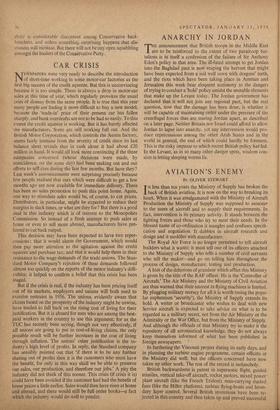CAR CRISIS
NEWSPAPERS were very ready to desctibe the introduction of short-time working in some motor-car factories as the first big success of the credit squeeze, But this is unconvincing because it is too simple. There is always a drop in motor-car sales at this time of year, which regularly provokes the usual cries of dismay from the same people. It is true that this year many people are finding it more difficult to buy a new model, because the 'trade-in' price of their present car has fallen sharply, and bank overdrafts are not to be had so easily. To this oxtent the credit squeeze is working. But it has barely affected • the manufacturers. Some are still working full out. And the British Motor Corporation, which controls the Austin factory, seems fairly immune from the severity of credit since its last balance sheet reveals that in cash alone it had about £20 million in hand. It would all look more convincing if the three companies concerned (whose decisions were made, by coincidence, on the same day) had been making out and out efforts to sell cars during the last few months. But have they? Last week's announcements were surprising precisely because few people realised that cars which were difficult to get a few months ago are now available for immediate delivery. There has been no sales promotion to push this point home. Again, one way to stimulate sales would be, of course, to cut prices.
Distributors, in particular, might be expected to reduce their margins in slack times, or what are they for? But there is a good deal in this industry which is of interest to the Monopolies Commission. So instead of a fresh attempt to push sales at home or even to sell more abroad, manufacturers have pre- ferred to cut back output.
This decision may have been expected to have two reper- cussions : that it would alarm the Government, which would then pay more attention to the agitation against the credit squeeze and purchase tax; and that it would help them in their resistance to the wage demands of the trade unions. The Stan- dard Motor Company'S rejection of these demands followed almost too quickly on the reports of the motor industry's diffi- culties; it helped to confirm a belief that this crisis has been staged.
But if the crisis is real, if the industry has been pricing itself out of its markets, employers and unions will both need to exercise restraint in 1956. The unions, evidently aware that claims based on the prosperity of the industry might be unwise. have tended to fall back on the rising cost of living for their justification. But it is absurd for men who are among the best- paid workers in the country to use this argument; for as the TUC has recently been saying, though not very effectively, if all unions are going to put in cost-of-living claims, the only possible result will be further increases in the cost of living through inflation. The unions' other justification is the in- dustry's high level of profits. In reply, the Standard company has sensibly pointed out that 'if there is to be any further sharing out of profits then it is the customers who must have the benefit, for only in this way shall we be able to preserve our sales, our production, and therefore our jobs.' A pity the industry did not think of this sooner. This crisis (if crisis it is) could have been avoided if the customer had had the benefit of lower prices a little earlier. Sales would then have risen at home and abroad, and there would still be full order books—a fact which the industry would do well to ponder,


































 Previous page
Previous page